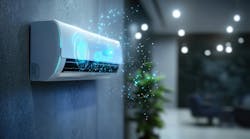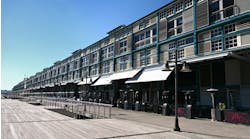With the emergence of every generation in the job market, the established workforce needs to learn how to contend with shifting cultures and viewpoints. This is especially important with millennials, who will make up 75% of the workforce by 2025, and Generation Z (born 1996-early 2000s), which is just coming of age professionally.
The facility management workforce continues to age; 45% of respondents to the International Facility Management Association’s (IFMA) survey are baby boomers and 40.4% are in Generation X. Thus, it is important for facilities professionals to learn how to integrate the younger generations into the industry.
The Emerging Talent Gap
As the average age of facilities managers continues to rise, it is important to look to millennials and Generation Z for fresh talent and as a source of new ideas. However, this can be difficult.
“Younger and older workers have always battled with assumptions that they make about each other,” says Lisa Ryan, Chief Appreciation Strategist at Grategy, a professional speaking and training company. “But now we have a generation that is wired and understands technology like none before. They think differently about how work should be done. They want to throw the 9-to-5 workday out the window.”
Many companies have changed the way that they do business in the last decade to account for this change, but the culture shift can be difficult. For an industry with an aging workforce, it is vital to consider these kinds of changes; otherwise, younger generations might not fill the positions of those who are retiring.
“It’s just a different mentality, so the companies that refuse to change are not going to make it,” explains Ryan. “When it comes to the trades, there is a shrinking pool of talent. How do you get those people? What are you going to do to keep them?”
Articulating the Importance of Facility Management
The best way to integrate younger generations into facility management is to promote the industry to a younger audience. Bridging the gap in understanding helps recruiting and retention of young, promising workers.
“When you think about millennials, it’s that they are one of the most educated generations ever because their parents pushed college,” says Ryan. “Now you have a generation with tons of student loan debt, that’s unable to find jobs in their area of study, and they feel like they are losing.”
This is one area where the industry needs to improve. Facilities professionals’ work is essential to their individual organizations, so it is important to articulate that and provide meaning for prospective millennials.
[Related: De-Risk Building Management with the Cloud]
“This generation is looking to make their work matter,” says Ryan. “They want to contribute at a higher level to feel like they are making a difference.”
As the oldest members of Generation Z begin looking at careers, it is also important to consider their generational point-of-view. For the most part, experts are guessing how they will affect the culture and practices of the workplace, but there are early indications about how they will operate.
“This is a much more entrepreneurial group because they see the dream of college that millennials got stuck into,” says Ryan. “They are seeing so many entrepreneurs creating their own companies and opportunities.”
There are going to be differences between millennials and Generation Z like there are with any other set of generations, so be sure to communicate how your work aligns with the values of each.
Integrating Younger People into the Workplace
Millennials are often maligned in the media for being lazy and entitled, but that is an unfair assessment, explains Ryan: “Millennials actually have a work ethic that is similar to the baby boomers. They want to work and are loyal. They are similar in a lot of ways to earlier generations, but they are wired differently.”
The main difference between millennials and earlier generations is their more goal-oriented workstyle and access to technology. Millennials are in tune with the gig-based economy that has emerged in recent years (e.g. Uber, Lyft, Airbnb) where success is defined through the completion of tasks.
This may cause tensions with the establishment, where the 9-to-5 has traditionally been the way of business. Millennials instead value a more fluid balance between work, life and relationships that is not as dependent on exactly how much time is spent but rather how it is being spent.
Because they are the first generation to grow up in the internet age, millennials also have a different relationship with technology.
“We have more available at our fingertips now, and now we have generations that are born multi-taskers,” says Ryan. “Their brains process things differently because they have always had their attention split by various screens.”
This embrace of technology has not only allowed millennials and Gen Z to process large volumes of information at any given moment, but it also has provoked a reconsideration of where work needs to be done. With access to open lines of communication, some work can be completed anywhere. The facilities industry needs to factor that into how it brings in talent.
It is also important that these open lines of communication extend to feedback in the workplace, as millennials and Generation Z require shorter and more frequent evaluations compared to the annual appraisal, explains Ryan. They have been receiving feedback their entire lives, and that needs to extend into the workplace.
Learning from Millennials and Gen Z
In addition to recruiting young talent, you should also try to learn from them and challenge old notions of how business should be conducted.
“Traditionalists (born before 1945) and boomers have a mentality that you have to pay your dues, but that’s not flying anymore,” explains Ryan. “We all have access to technology, and many people now have a higher level of education.”
Because of the greater access to information, the playing field ought to be leveled. The workplace establishment should also learn from younger generations and listen to their viewpoints.
“It is important to listen and value contributions, no matter the level of expertise,” explains Ryan. “Build relationships so that millennials will stay. We need to invest our trust and interest and to learn from them as much as they learn from us.”
Justin Feit was an associate editor of BUILDINGS.
Two handpicked articles to read next:


